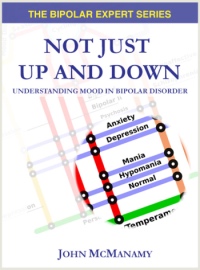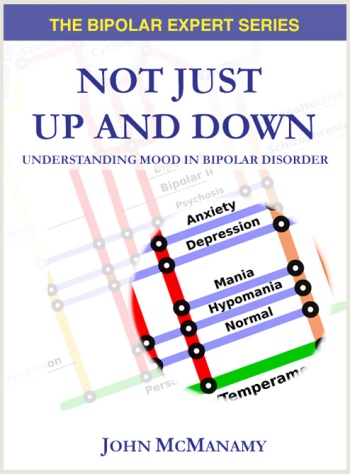Stupid Advocacy Kills
 |
For every dollar spent on AIDS research, we get one penny. Why? AIDS advocates are smart, our advocates are stupid.
|
Mental health advocacy. In late April or early May 2003, I was in San Francisco for six days of the American Psychiatric Association's annual meeting. Two or three days into the conference, as I was making my way across the street from the north complex of the Muscone Convention Center to the south, I came upon an organized demonstration of psychiatric survivors brandishing "Psychiatry Kills" and similar signs.
Their personal experience certainly justified their outrage against psychiatry. An earlier generation was subjected to the horrors of captivity in state institutions. A later generation experienced a different type of abuse in the form of the bad practice of medicine, often applied in a not so subtly coercive "take your meds and shut up" environment.
My New Book!

Purchase now.
But I was here to find out what was going on inside the Muscone Center, not outside. I waited till the marchers passed, then made my way to my next round of listening to very smart people talk real fast in dark rooms.
I heard more from the psychiatric survivors a few months later in the form of a challenge to the APA, NAMI, and the Surgeon General issued by six individuals associated with MindFreedom, including its founder David Oaks. Robert Whitaker picks up the account in the last chapter of "Anatomy of an Epidemic":
Among other things, the MindFreedom group asked for evidence proving that major mental illnesses are "biologically-based brain diseases" and for any evidence that "any psychiatric drug can correct a chemical imbalance" in the brain.
The six individuals threatened a hunger strike unless one of the organizations served up the evidence. The APA through its medical director wrote back that "the answers to your questions are widely available in the scientific literature, and have been for years," then suggested a textbook and the Surgeon General's 1999 Mental Health report (which ironically stated "the precise [etiology] of mental disorders are not known").
The Six went on their "fast for freedom," which lasted till medical complications broke out. Then they issued a press release stating that the APA, NAMI, and "the rest of the psychiatric community" were indifferent to those "who would deny that serious mental disorders are real medical conditions ..."
According to Whitaker:
It was clear to all observers who had won this battle. The strikers had called the APA's bluff, and the APA had come up empty.
I'm glad Whitaker saved this account for the last chapter rather than the first. Otherwise I would have tossed his book in the trash. Clearly - unless you subscribe to Thomas Szasz - the biology of the brain influences behavior. We think with our meat (thanks, Terry Bisson, for the metaphor). We feel with our meat. We perceive with our meat. And when our meat malfunctions bad things happen. It doesn't matter what you call it, bad things happen.
If psychiatry is stupid, then the antipsychiatry response is equally, if not more spectacularly, stupid. You don't fight stupid with stupid. If gay activists had been in denial about a mysterious phenomenon that was decimating their population back in the eighties, there would have been minimal funding for HIV/AIDS research and treatment. In fact, at the very beginning of the epidemic the gay population was in denial. Then they got smart. They got loud. They literally intimidated the government and medical establishment into action. In 2009, the NIH allocated $3.19 billion for HIV/AIDS research. By contrast, research for depression (including bipolar) was a mere $402 million.
Million, not billion. These are ratios that have held fairly steady over the years. Approximately 1.5 million individuals in the US are affected by HIV or AIDS. About 19 million in the US in any given year deal with depression or bipolar. That translates to the NIH spending $2,013 per patient for HIV/AIDS research vs a paltry $21 per patient for depression and bipolar. Putting it another way, for every dollar the NIH invests in an HIV/AIDS patient, depression and bipolar patients get one penny.
One penny. That's the value the government and medical establishment places on our lives, in large part based on the stupid and in-denial showboating advocacy that Whitaker so enthusiastically endorses. No, Whitaker, no one "won" that battle. We all lost, bigtime. If the loudest in our midst are denying that mental illness exists, then why fund its research and treatment? Obviously the people responsible for funding things have asked themselves that very same question. Don't get me started.
Too Late, You Got Me Started
It works this way: When the loudest in our midst are in denial about the reality of mental illness, we simply don't get decent funding for its research and treatment. The funding goes to illnesses whose patient populations have their act together.
In Sept 2006, a friend took me to a function at a drop-in center in Berkeley, CA, organized by antipsychiatry activists. The meeting started with everyone in the circle, myself included, introducing themselves. One guy bragged how he spearheaded a drive to outlaw ECT in Berkeley in the 1980s.
You're actually proud of that? I wanted to say.
Another happened to reveal how she organized the very demo I had witnessed outside the 2003 APA in San Francisco. I had to use all my self-control to breathe through my nose. Here is what I was thinking, sitting in my chair, polite smile frozen into place:
If you had actually followed me indoors rather than made noise on the streets, you might have actually learned something.
The speakers inside actually addressed the questions the MindFreedom people had posed, in a nuanced way that totally challenged the thinking of everyone in attendance. So much so that three years later in Berkeley my head was still spinning. At the APA, I heard Daniel Weinberger of the NIMH report on a 2002 study I have mentioned many times in this Website and elsewhere.
The study linked a certain gene variation to the fear response in the amygdala in the brain's limbic system. For possibly the first time, we had a connection between a gene and emotion. This is not the same as saying we have a connection between a gene and a DSM mental illness. Critical distinction.
At about the same time, a study on a birth cohort in New Zealand found that those with this exact same gene variation had a much greater tendency to become depressed when exposed to certain stressful situations such as financial difficulties.
Again, this is hardly the biological causal link that MindFreedom was demanding. The brain is way too complex to yield those kind of pat answers. What these and numerous follow-up studies showed in essence was that bad things tend to happen when a biologically vulnerable brain is exposed to stressful situations. It's an old theory, but now the brain science was beginning to validate it.
No one talks about genes and biology in a vacuum anymore. It's all about the how genes and biology and environment interact.
At another session, I heard Robert Freedman of the University of Colorado tell a demonstrably appreciative crowd that "genes do not encode for psychopathology." In other words, forget about finding a depression gene or a bipolar gene or a schizophrenia gene. Dr Freedman is a pioneer in "endophenotype." He wondered why those with schizophrenia craved cigarettes. He discovered a variation in a nicotinic receptor gene that may account for this, that had to do with "auditory gating" that plays a major role in tuning out distracting noises.
Ah, if we could only tune out the distractions.
Again, hardly a direct biological causal link to a specific mental illness, which was Freedman's very point. The brain is not organized according to the DSM. That's one reason "depression," "bipolar," "schizophrenia," "anxiety," and so on are at best rough guides. Two individuals with bipolar, for instance, may not even have the same symptoms in common. But they are both likely to have messed up sleep. So let's investigate the messed up sleep and see if that will give us insights into why we find ourselves too depressed to get out of bed in the morning.
Then, maybe, we can come up with specific treatments that address our real problems rather than stupid one-size-fits all remedies that fit only a lucky few. Assuming we get some decent research funding, that is.
That's why "chemical imbalance" of the brain doesn't begin to tell us what is going on. Whitaker very elegantly debunked that particular myth in his book, along with the fallacy of treatments to correct this chemical imbalance. An antidepressant to treat depression? It's a stupid idea if we persist in thinking a depression is a depression is a depression. So far so good. But then Whitaker mistakenly assumes that because the chemical imbalance myth is wrong then the whole premise of psychiatry is wrong.
Whitaker not so implicitly takes this further: If psychiatry is wrong, then antipsychiatry has to be right. The problem is there is no nuance to antipsychiatry. Its spokespersons deny that mental illness exists in the first place, along with the possibility of finding treatments, which explains why everyone at the meeting I walked into in Berkeley talked about their experiences in making noise rather than helping people.
What is really going on is that the whole premise of psychiatry is changing to a point where it may not be called psychiatry anymore. The smart thinkers in the field know that the biological psychiatry/disease model of behavior is long past its sell-by date, and that a new science of the mind is taking its place, even if this is not readily apparent at street level. That is what I observed inside the APA annual meeting in San Francisco in 2003. I wish some of the protestors outside could have followed me in. I wish Whitaker could have followed me in.
First published as a blog Oct 2010, republished as an article Jan 14, 2011
 |
More articles on mental health issues. |




